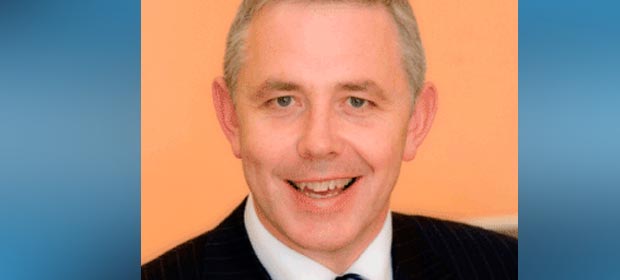- Tony O’Brien to be new HSE Director General
- How the HSE re-structuring will work
- Minister’s Policy Adviser
- Re-organising the health services
- HSE told not to close beds
- Temple Street Hospital Opens New ‘Surgical Flat’ Ward
- Twenty primary care facilities
- Generic Substitution Bill
- Design Team for new Central Mental Hospital
- HSE proposes longer working week for staff
Tony O’Brien to be new HSE Director General

The Minister for Health Dr. James Reilly has announced that Mr. Tony O’Brien is the new Director General designate for the HSE.
Mr. O’Brien will formally assume the position of Director General once the new Governance Legislation is passed by the Oireachtas in the autumn. In the meantime, as Director General designate, he will work closely with all relevant figures in the HSE in preparing for the new Directorate structure which is being established under that legislation.
The Chief Executive of the HSE, Mr. Cathal Magee previously announced his intention to step down from the HSE CEO position.
When he leaves, Mr. O’Brien is expected to become the Acting Chief Executive. Mr. O’Brien will remain in that position until the Governance legislation is passed, at which time he will formally become the Director General and the post of Chief Executive will cease to exist.
Over the last year Tony O’Brien has been the Chief Operating Officer of the Special Delivery Unit in the Department of Health.
He was previously Chief Advisor to the HSE on the implementation of the National Cancer Control Strategy, Project Director for the National Plan for Radiation Oncology, Director of BreastCheck and Director CervicalCheck.
Up to the announcement that he was HSE Director General Designate, he was CEO of the National Treatment Purchase Fund, Chair of the National Cancer Registry Board and Adjunct Associate |Professor, Health Policy and Management, TCD.
He has been a member of the Board of the HSE since last March and since December 2011 he has been a member of the Management Advisory Committee of the Department of Health.
From May 2011 to December 2011 he was Director, National Directorate Clinical Strategy and Programmes in the HSE.
He was Chief Executive of the Irish Family Planning Association from December 1991 to August 2002. He was Chief Executive of the UK Family Planning Association from May 1995 to April 1996.
Tony O’Brien comes from Connemara, Co. Galway. Aged 49, he is married with two children and lives in County Louth. He holds an M.Sc. in Management Practice.
Speaking of his suitability to the task ahead the Minister for Health said “Tony O’Brien has demonstrated, in a range of different areas, a capability of implementing progress. As Chief Operating Officer of the Special Delivery Unit he has worked with stakeholders across the country to put in place measurable improvements. I am satisfied that Tony O’Brien has the qualities needed to drive the essential reform required to ultimately end our two-tier health system. He also has the strategic capability to manage an enhanced architecture of financial control now being placed in the HSE.”
“I also wish to thank Mr. Cathal Magee for his commitment to the health service and acknowledge his contributions, including maintaining safe health services against the greatest of challenges; major reductions in funding, a significant exodus of staff and a moratorium imposed due to our fiscal difficulties”.
How the HSE re- will work
The major re-structuring of the Irish health service announced this month by Health Minister, Dr. James Reilly provides for the establishment of a new Directorate to govern a re-organised HSE.

The Minister also signalled that while the new Director General of the HSE, subsequently announced as Mr Tony O’Brien, would be the accounting officer for the current year, the vote would return to the Department of Health in 2013.
The new Bill – the Health Service Executive (Governance) Bill 2012 also gives the Minister power to issue directions and specify priorities to the HSE.
It will strengthen the provisions for Ministerial policy directions and priority settings and require the HSE to account for its performance to the Minister through the Secretary General of the Department of Health.
Under the Bill, the Directorate will consist of a Director General and other directors.
The new Directors will be nominated and appointed by the Minister from within the existing HSE National Directors. There will be a minimum of three and a maximum of seven Directors (including the Director General) The new Directors will be closely aligned to specific areas of service such as primary care, mental health, hospitals and more.
The Directors will have a three year term of office. The legislation provides for an alteration to number of Directors if later required.
The first Director General was also nominated and will be appointed by the Minister. He will be a member and Chairperson – as opposed to Chief -of the Directorate. There is provision for future Directors General to be recruited in accordance with the Public Service Management (Recruitment and appointments) Act 2004.
The Minister said these changes would be just transitional and that as the reforms progressed, the HSE would no longer exist and its functions would be moved elsewhere.
Shortly before the new structures were announced, Mr. Cathal Magee, HSE Chief Executive informed the Minister that he was stepping down from his post. He said he would not be seeking any compensation for the unexpired portion of his contract, which it is speculated could be worth about €1 million.
Dr. Reilly said that the new Bill will allow a reorganisation of services to prepare the way for the wider introduction of the ‘money follows the patient principle’ and the ultimate introduction of Universal Health Insurance.
The Bill, which has been approved by Cabinet, will provide for further accountability arrangements for the HSE and provide for related matters including a number of technical amendments to take account of the replacement of the Board structure by the Directorate structure.
The legal status of the HSE under the Health Act 2004 does not change under the Bill and HSE employees will remain the employees of the HSE.
The Department said that in line with health reform policy, the Bill is intended to make the HSE more directly accountable to the Minister for Health, who in turn is accountable to the people through the Oireachtas and help prepare the service delivery for the next phase of the health reform programme.
Provisions in the Bill build on existing accountability arrangements under the Health Act 2004.
The Directorate will be accountable to the Minister for the performance of the HSE’s functions as well as its own. As chairperson, the Director General will account to the Minister on behalf of the Directorate in regard to how the HSE’s functions are performed. He or she will do this through the Secretary General of the Department of Health.
The Minister said the HSE has responsibility for the organisation and delivery of health services and the Directorate will be accountable to the Minister for the performance of HSE functions – it will have to explain its decisions.
The Bill allows the Minister to issue directions to the HSE on the implementation of Ministerial and Government policies and objectives relating to HSE functions where the Minister believes that the HSE is not having sufficient regard to such objectives or policies in performing its functions.
The Minister will also be empowered to specify priorities for the HSE which the HSE must have regard to in preparing its service plan.
The Minister may establish performance targets for the HSE in regard to these priorities.
Directions, priorities and targets won’t be made in relation to individual patients or service users.
In anticipation of the legislative changes, the Minister intends that the HSE would recruit and appoint heads of health & wellbeing, hospitals, primary care, mental health and social care. It is envisaged that employees heading up these service areas and children’s services will be appointed as members of the Directorate.
The Directorate is a transitional, interim move. Transitional governing arrangements are needed in the HSE to prepare health service delivery systems for the next phase of the health reform programme. As the health reform programme advances, the HSE will eventually no longer exist as its functions move elsewhere.
It is not anticipated that the new legislation will result in any increased costs to the Exchequer.
Minister’s Policy Adviser
A former senior health manager, Ms. Maureen Windle, BA., FCCA, MSc, has been appointed as Policy Adviser to the Minister for Health, Dr. James Reilly, T.D., in succession to Mr. Sean Faughnan.

Ms. Windle – an accountant, management consultant and senior health manager, by profession – is the former Chief Executive of the Northern Area Health Board.
She previously worked in the former Eastern Health Board as a Financial Accountant and Programme Manager (with responsibility for primary care and disability services)
She has been Chairman of the Irish Medicine Board’s Audit Committee, Chairman of the GMS Payments Board, a member of the Board of Fold Housing Association Ltd and Chairman of the company’s Finance and Audit Committee.
Re-organising the health services
Professor John R. Higgins, Professor of Obstetrics and Gynaecology at Cork University Maternity Hospital and Head of the UCC College of Medicine and Health, has been appointed to work with the Special Delivery Unit (SDU) in the role of Chair of a Strategic Board to assist the Department of Health in the design and establishment of Hospital Groups.

As Chair, he will have a key role in implementing the agreed Project Plan for the creation of Hospital Groups initially and ultimately Independent Hospital Trusts.
Mr. Noel Daly, who served in senior management positions in healthcare in the UK and USA before establishing The Health Partnership in Ireland in 2004 has been appointed to the role of Chair of the Galway Roscommon University Hospital Group and Professor Niall O’Higgins, Professor Emeritus of Surgery, University College Dublin and former RCSI President, has been appointed as Chair of the Mid-Western Regional Hospital Group.
The term of the appointments is for three years and the boards of the groups will be established initially on a non-statutory basis.
The Department said that the two new hospital group Chairmen, working in consultation with the Chair of the Strategic Board, will have key roles in the development of effective corporate and clinical governance structures for the groups along with the quality and safety of systems of care in place for patients of the hospital groups. Central to this will be overseeing the implementation of the relevant recommendations of the HIQA report in relation to Tallaght Hospital.
The Minister for Health, Dr. James Reilly identified a number of key responsibilities for the Chairmen including:
- Ensuring compliance with the Code of Practice for Governance of State Bodies.
- Undertaking an assessment of the composition, competency profile and potential conflicts of interest of potential board members and making the necessary. changes required to ensure that the board is constituted appropriately and in accordance with modern day corporate governance of boards.
- Mandatory board induction programme for new board members and mandatory on-going development programme for board members, which the Department will address at a national level.
- Clear definition of the role and function of the board.
- Oversight of the building of strategic partnerships with other key stakeholders so that the organisation does not operate in isolation of the national and local system for delivery of care and support to its population.
- Ensuring that a clear scheme of delegation of accountability from the board to the Chief Executive and executive directors is designed, taking account of the interim accountability arrangements put in place by the HSE to manage the transition towards the establishment of the independent, competing Trusts planned as part of the programme for government.
- Ensuring that there are annually agreed objectives in place for the Chief Executive that accurately reflects the realm of their accountability, responsibility and authority.
The Minister said he believed it was essential that the business of the board is conducted in an open and transparent manner with the maximum amount of its meetings held in public by June 2013 including an Annual General Meeting in public from 2013. He has also instructed that a self-evaluation of the board should be carried out and arrangements should be in place to facilitate staff to raise concerns about the quality and safety of patient care and for consideration of information provided by external sources, including patient advocates, in relation to the delivery of safe care to patients.
Establishment of oversight group
In a separate but related development following publication of the HIQA Report on Tallaght Hospital, the Minister established an oversight group to oversee the implementation of its significant recommendations. The group will be chaired by Dr Tony Holohan, Chief Medical Officer of the Department of Health .
The confirmed membership of the Group is:
Dr. Beth Lilja , Director, Danish Society for Patient Safety, Dr. Carol Peden, Royal United Hospital, Bath, Mr. David Dalton, CEO, Salford Royal NHS Foundation Trust, Mr. Gerry Marr, CEO, NHS Board Headquarters, Dr. Deirdre Madden, Senior Lecturer, Faculty of Law, University College Cork, Dr. Fergus Clancy, Chairman, Independent Hospital Association of Ireland. Confirmation is awaited from two further members.
HSE told not to close beds

The Secretary General of the Department of Health, Dr. Ambrose McLoughlin has told the HSE not to close additional beds or reduce elective hospital work in a bid to tackle its overspending which had reached €280 million by the end of May. These were part of cost cutting proposals made by the HSE.
Instead, Dr. McLoughlin – who is also chairman of the Board of the HSE – told HSE Chief Executive, Mr. Cathal Magee to look for savings in areas such as overtime, sick leave, use of agency staff and drug prescribing by doctors.
He also asked Mr. Magee to examine all budget allocations and programmes to identify areas where money had been underspent, any schemes in development which were not yet in place that could be delayed or deferred or any opportunity to reallocate.
Temple Street Hospital Opens New ‘Surgical Flat’ Ward
The Children’s University Hospital in Temple Street, Dublin has officially opened a new ward, complete with state-of-the-art facilities, which was financed entirely through the hospital’s fundraising office.
The surgical ward caters primarily for children in need of surgery and cost almost €900,000. Consisting of 12 beds, the new ward also has four isolated beds for children that are required to be kept in isolation. The Surgical Flat ward is located adjacent to the hospital’s theatre, allowing ease of transfer for children requiring General Surgery, Orthopaedics, Plastic Surgery, Ophthalmology and Ear, Nose and Throat Surgery, including Cochlear Implants.
Established in 1872, Children’s University Hospital, Temple Street is a national facility that provides paediatric care to children from all over Ireland. The hospital takes care of over 130,000 sick or injured children every year of which one-third of inpatients come from outside Dublin. The Accident and Emergency Department caters for almost 50,000 children annually, making it one of the busiest A&E facilities in Europe and the fundraising office relies on the generosity and support of people from all over Ireland to make sure that every child that comes to Temple Street receives the best possible standard of care. .
Major specialities at the Children’s University Hospital include Neonatal and Paediatric Surgery, Nephrology, Neurology, Neurosurgery, Craniofacial surgery, Orthopaedic, ENT and Plastic Surgery.
Twenty primary care facilities
Primary care facilities are to be developed at twenty locations across the country using the public private partnership mechanism, as part of the government’s stimulus programme.
Health Minister, Dr. James Reilly said the Exchequer would continue to fund the delivery of Primary Care Centres.
The 20 locations where the new primary care facilities will be commissioned will be selected from 35 locations, subject to agreement between the local GPs and the HSE on active local GP involvement in the centres. The twenty will be offered to the market in bundles of ten.
A further list of Primary Care developments will be announced in the last quarter of this year.
The 35 locations are Balbriggan, Ballaghadereen, Ballymote, Co Sligo, Boyle, Co Roscommon, Carrickmacross, Carrick-on-Suir, Claremorris, Clonmel, Coolock Cork City, (Togher) Crumlin/Drimnagh, Darndale, Donegal Town, Drogheda North, Dublin Inner City, (Summerhill) Dungarvan, Dungloe, Co Donegal, Ennis, Gort, Kells, Kilcock, Kilkenny. Knocklyon/Rathfarnham, Laytown/Bettystown, Limerick City, Rathdrum, Co Wicklow, Rowlagh/North Clondalkin, Swords, Thurles, Tralee, Tuam, Tullow/Rathvill,y (East Carlow) Waterford City ,Westport and Wexford Town.
The Minister has also announced the planned recruitment of over 270 new staff to work in Primary Care.
He said “key frontline staff will be recruited, funded by a special allocation of €20m which was set aside as part of the HSE’s 2012 National Service Plan to fill posts in Primary Care”.
The funding will provide for the employment of 17 Clinical Nurse Specialists to support the Integrated Care Diabetes Programme and some 255 other Primary Care Team posts, including Public Health Nurses, Registered General Nurses, Physiotherapists, Occupational Therapists and Speech and Language Therapists.
The HSE has analysed the current provision of posts in proportion to total population and population health needs with reference to the Haase-Pratschke Deprivation Index to identify which areas are least well served. The Primary Care posts will be allocated to the areas most in need, taking into account the Deprivation index and other key criteria such as the size and composition of relevant waiting lists and the resources available in other health facilities within the individual areas.”
The Minister said that as part of the process of strengthening primary care, a number of key outcomes measurements will also be introduced.”
Generic Substitution Bill
The Minister of State with responsibility for Primary Care has published the Health (Pricing and Supply of Medical Goods) Bill 2012, which provides for the introduction of a system of generic substitution and reference pricing.
Currently, when a specific brand of medicine is prescribed for a patient, a pharmacist can only supply that particular brand, even when less expensive generic versions of the same medicine are available. The Bill permits pharmacists to substitute medicines which have been designated as interchangeable by the Irish Medicines Board. Substitution will only be allowed where it is safe to do so.
Reference pricing involves the setting of a common reimbursement price, or reference price, for a group of interchangeable medicines. Eligible patients will not face any additional costs for products priced at or below the reference price. If a patient would like to receive a particular brand that costs more than the reference price then the patient will have to pay the additional cost of that product. In cases where substitution is prohibited for clinical reasons, patients will not face any additional costs if the prescribed product costs more than the reference price.
The Department says that generic substitution coupled with reference pricing provides patients with an incentive to opt for the cheapest available product, but does not impose any unavoidable additional costs on patients.
The Bill also sets out statutory procedures governing the supply, reimbursement and pricing of medicines and other items to patients under the GMS and community drugs schemes. The Bill will allow the HSE to attach conditions to the supply of certain items, provided that any restrictions are evidence-based and in the interests of patients and ensuring value for money.
The Department says these measures will promote pric competition and deliver lower medicine prices for both the State and patients.
Design Team for new Central Mental Hospital
The HSE has appointed a Design Team for the re-configuration of National Forensic Mental Health Service Facilities to replace the Central Mental Hospital in Dundrum.
The design team will commence work immediately on the design of the new facilities, which include a new modern, state of the art National Forensic Hospital, a Forensic Child and Adolescent Mental Health Unit, a Forensic Mental Health Intellectual Disability Unit and an Intensive Care Rehabilitation Unit (ICRU) to be located at Portrane, Co. Dublin, as well as three regional ICRUs that will be located at HSE South, HSE West and Dublin Mid Leinster regions.
It is expected that construction will commence in 2014 and take two years to complete.
HSE proposes longer working week for staff
A number of options which would increase staff working hours and reduce overtime payments has been proposed by the HSE in a bid to balance its budget for 2012.
Options put forward to the trade unions include asking staff to work an additional two hours per week for the next two to three years, discontinuing flexitime arrangements, paying overtime at a flat hourly rate – with no premium payment – and ending the current arrangement, whereby some staff are paid time and one-sixth for work carried out between 6pm and 8pm.
The HSE has asked unions if there was scope for any of the options to be applied in the health sector, rather than across the public service.
HSE national director Barry O’Brien was quoted as saying the Executive was committed to the Croke Park agreement and wanted to work within the framework of the deal. He said the HSE wanted to protect core pay and ensure there were no compulsory redundancies. The options were put forward as a mechanism to generate constructive debate between trade unions and management on what was viable.
The unions were also told that the HSE would have to reduce its current total workforce to make room for the 600 new posts in mental health and primary care sanctioned by the Government. These new personnel, to be recruited in 2012 and 2013, have to be accommodated within the HSE’s existing official staff ceiling, which is already 150 over its limit.

